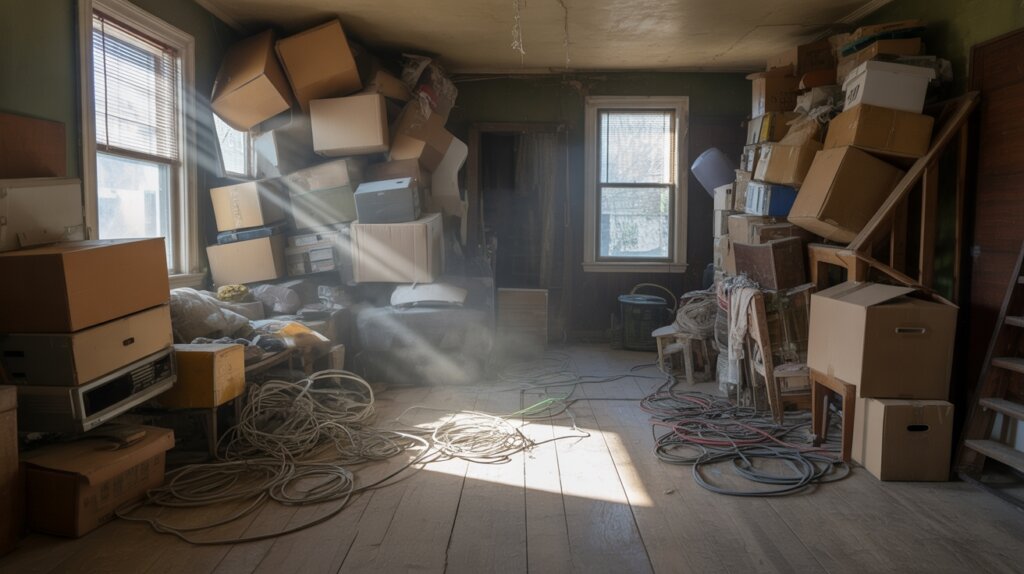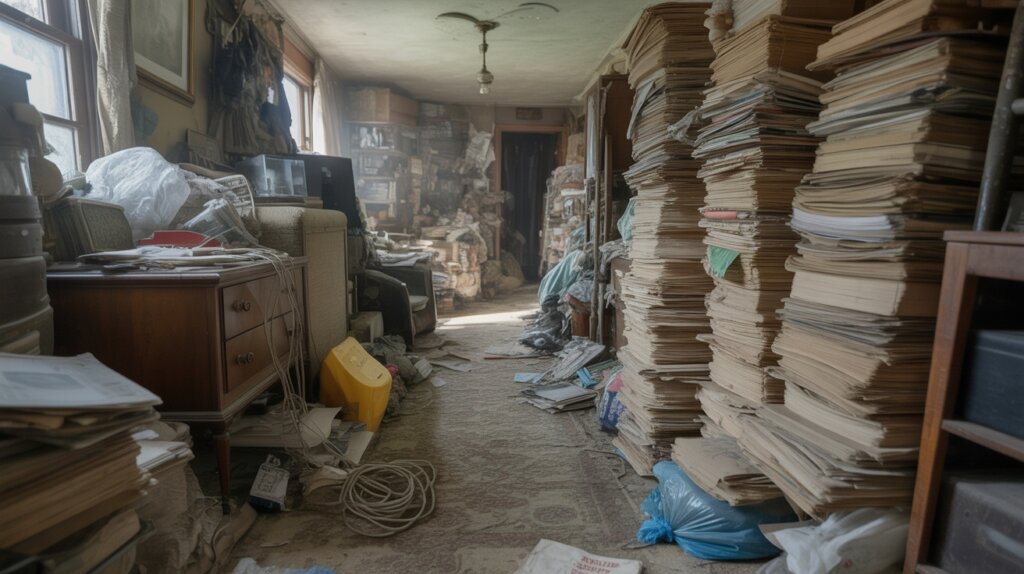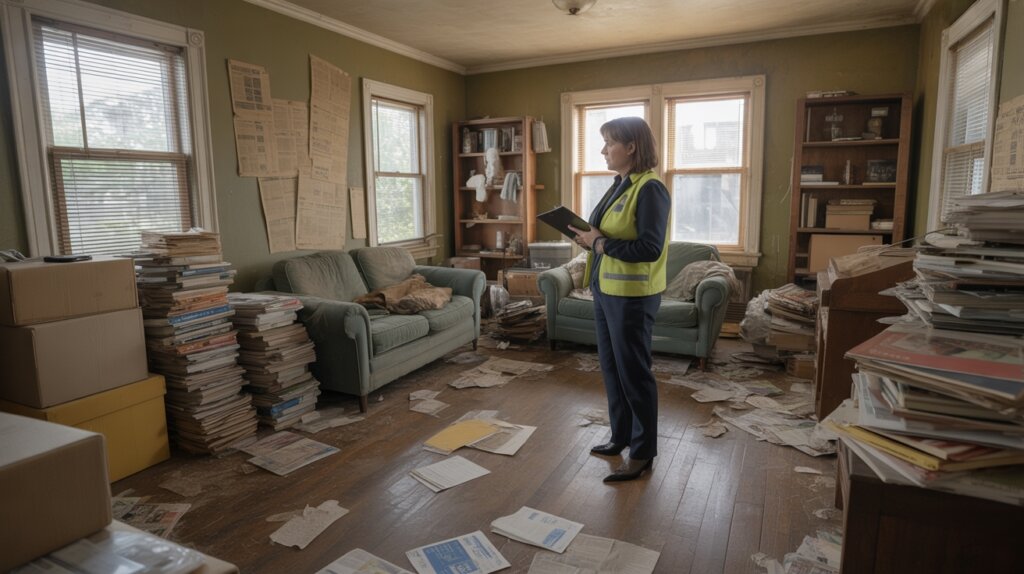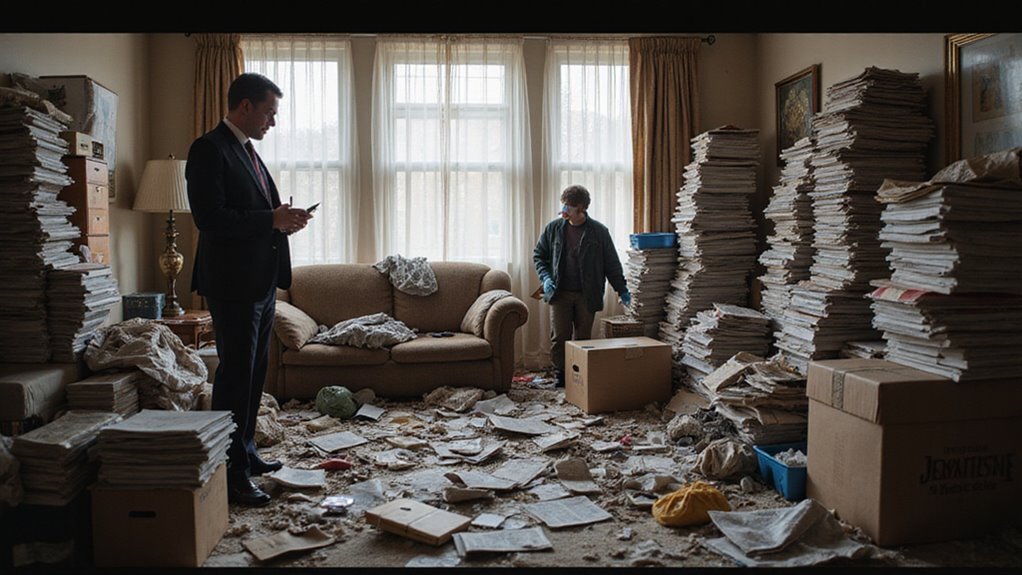Selling a hoarder house is difficult. These homes often have clutter, damage, and safety hazards that scare away buyers. The property may sell for much less than similar homes in the area.
The problem gets worse because buyers worry about hidden problems and high repair costs. Emotional stress and legal complications make the sale even harder. Many sellers feel overwhelmed by the process.
But you can overcome these obstacles with the right plan. You can sell a hoarder house by understanding the challenges and taking simple, strategic steps. This blog will guide you through every step and help you get the best possible result.
Key Takeaways
- Hoarder houses often hide safety hazards and structural issues, so get a thorough inspection and address critical repairs before listing.
- Emotional attachment and family disagreements can delay decluttering; seek professional support and set clear boundaries to make progress.
- Heavy clutter and biohazards reduce buyer interest; invest in targeted cleaning or market the property honestly “as-is” to attract investors.
- Legal disclosure of property issues, including pests and damage, is required to avoid liability and build buyer trust.
- Pricing realistically based on condition and repair costs helps attract serious buyers and ensures a smoother, faster sale.
Understanding What Constitutes a Hoarder House

A hoarder house is more than just a messy home. It contains so many items that rooms become hard or impossible to use. If you see blocked walkways or stacked belongings, it may be a hoarder house.
Hoarders often find it very hard to let go of things. Many keep items because of strong feelings or memories. This emotional attachment makes cleaning up more difficult.
When you look at a property, check if the clutter is extreme or just normal mess. If there is a pattern of collecting and saving almost everything, it is likely hoarding. Understanding this helps you plan cleanup and estimate the home’s value.
If the clutter is removed and rooms are cleared, the house can attract buyers. You can then market the home by showing its true potential. Setting clear goals for cleaning will help with resale.
Additionally, knowing how to price the property accurately after decluttering—pricing strategies—can significantly influence the sale outcome.
Identifying Common Hazards and Safety Issues
When you assess a hoarder house, you’ll need to watch for hidden structural damage that clutter can obscure, impacting both safety and repair costs. Biohazards like mold, animal waste, or decaying materials, along with pest infestations, can quickly deter buyers and complicate inspections. Addressing these risks upfront will help you position the property more effectively in the market.
Additionally, conducting a professional home evaluation can help identify appropriate repair estimates and necessary safety measures before listing. It’s also important to be aware of potential title issues, such as disputes or encumbrances, which can complicate the sale process and require resolution before proceeding.
Hidden Structural Damage Risks
Hidden structural damage is a common risk in hoarder houses. Serious issues like weak walls, uneven floors, or roof leaks often hide under clutter. If these problems go unnoticed, they can make the home unsafe for anyone inside.
Foundation damage is also a major worry. Heavy clutter and unnoticed water leaks can cause cracks or shifts in the foundation. These issues can lower the house’s value and make it harder to sell.
If you plan to sell, you should hire a home inspector with experience in hoarder homes. The inspector will look for hidden structural problems and report their findings. If you find issues early, you can fix them, adjust your price, or share them with buyers for a smoother sale.
Biohazard and Pest Concerns
Hoarder houses often have biohazards and pest problems. Waste, mold, and animal droppings can make these homes unsafe. If buyers notice these issues, they may walk away or offer much less money.
If you want to sell, hire professionals to clean biohazards. Proper cleaning removes dangerous substances and makes the house safer. An appraiser will also give a better value after cleanup.
If you see signs of pests, call a licensed pest control company. Exterminators can treat the infestation and help stop it from returning. Providing proof of this work may reassure future buyers.
Taking care of these problems could help you sell faster and at a better price. If you ignore them, the house may stay on the market longer. Remediation can make negotiations smoother and attract more buyers.
Assessing Structural and Maintenance Problems

When selling a hoarder house, you need to look past the clutter to identify hidden structural damage and deferred maintenance. Focus on evaluating which repairs are essential and prioritize safety hazards that could impact a sale or inspection. Taking a strategic approach here lets you target your budget toward improvements that matter most to buyers and regulators.
Additionally, be aware of potential termite damage, which can compromise the integrity of the structure even if it isn’t immediately visible. Conducting a market analysis can help determine the urgency and pricing strategy for necessary repairs, ensuring your property appeals to prospective buyers.
Identifying Hidden Damage
Hoarder houses can hide serious damage under clutter. You need to look past the mess to find true problems. If you miss hidden damage, repairs can become expensive and difficult.
Start by checking the foundation and floors for cracks or soft spots. Look for signs like warping as you clear debris. If you see these issues, there may be bigger structural problems.
Next, examine walls and ceilings for stains or bubbling paint. Musty smells can mean mold or water damage. If you notice these signs, further inspection is needed.
Finally, inspect electrical and plumbing systems when items are moved. Exposed wires or leaks are common in hidden spaces. If you find these, call a professional for safety.
If the process feels overwhelming, emotional support may help. Sellers might also need extra understanding during this time. If you both stay calm, the cleanup can go more smoothly.
Evaluating Essential Repairs
To make a property marketable, you must identify which repairs are essential. Focus first on areas that affect safety and function. These repairs will help attract buyers and pass inspection.
Begin by checking the home’s main parts: foundation, roof, plumbing, and electrical systems. If you find debris, clear it out using safety gear. After cleaning, look for hidden problems like water damage, mold, or pests.
If there are structural or maintenance issues, fix these before cosmetic changes. Address leaks, unstable floors, or faulty wiring first. Cosmetic repairs can wait if the main systems are not sound.
You should get estimates from licensed contractors for the needed repairs. Compare the costs with the potential increase in property value. This approach helps you decide which repairs are truly worth doing.
Prioritizing Safety Hazards
You should always fix safety hazards and structural problems first. These issues are the most important for both buyers and inspectors. If you ignore them, you may face bigger problems later.
Start by looking for damaged floors, walls, or ceilings. If you find any, repair them right away. Faulty wiring or leaking pipes should also be replaced quickly.
When you clear out clutter, you can spot hidden hazards more easily. If you need to keep certain items, use smart storage to keep walkways clear. Clear hallways and doorways help everyone move safely through the home.
Navigating Emotional Challenges for Sellers

Selling a hoarder house comes with emotional challenges. You may feel attached to belongings and memories, making it hard to let go. Family members might also have different opinions and emotional connections. Recognizing the emotional attachment to possessions and seeking emotional support systems can be beneficial during this process. Clear communication with your family can prevent misunderstandings.
If conflicts arise, you should set boundaries early in the process. A neutral third party, such as a counselor or mediator, can help with tough conversations. Your main goal is to sell the house for the best price. If you focus on emotional well-being, you will make decisions more easily. Handling emotions directly can make the selling process smoother and more successful.
Legal Considerations and Disclosure Requirements
You’ll need to address mandatory property disclosures, any outstanding code violations, and existing liens before listing a hoarder house. Tackling these issues early helps you avoid legal setbacks and builds buyer confidence. By staying proactive, you position your property for a smoother and more transparent sale.
Additionally, understanding home selling myths can help you navigate pricing and negotiations more effectively. Recognizing the importance of legal documentation and court supervision ensures compliance throughout the sale process, especially when resolving title issues during probate.
Mandatory Property Disclosures
Mandatory property disclosures are required when selling a hoarder house. Sellers must share any issues that could affect a buyer’s choice. These include clutter, pests, or water damage.
If you do not disclose these facts, you risk legal trouble. Honest disclosures can also help keep negotiations on track. Buyers are more likely to trust a seller who is open.
Sellers should document all known issues and repairs. Photos and written notes can provide clear records. These details can answer buyer questions later.
Home staging and virtual tours can help buyers see the home’s potential. Clean and organized spaces make problems seem more manageable. If you show the best features, buyers may be more interested.
A real estate agent can guide you through the disclosure forms. Agents also help answer buyer questions accurately. If you are unsure, always ask your agent for advice.
Code Violations and Compliance
Code violations are a major issue when selling a hoarder house. These can include unsafe wiring, blocked exits, or unapproved renovations. Buyers and local authorities will want to know about these problems.
A thorough inspection can identify all the code violations. Sellers must share these findings with buyers to avoid future legal issues. If possible, fixing the most serious violations can help attract more buyers.
If repairs are not possible, sellers can offer the house “as-is” to investors. They should expect lower offers due to the risks involved. Full disclosure is always important for a smooth sale.
Dealing With Liens
Liens are legal claims on a property for unpaid debts. These can come from unpaid taxes, contractor bills, or utility charges. Liens must be resolved before selling a hoarder house.
A title search will show all liens and their order of payment. Some liens, like property taxes, get paid first if the home sells. You should always disclose liens to buyers because it is a legal requirement.
If you find liens, you can contact lienholders to try and settle or reduce the debts. Resolving liens early will help avoid delays or complications during the sale. If you are proactive, you make the process smoother and keep buyers interested.
Managing Health and Sanitation Concerns
Health and sanitation problems can stop buyers from making an offer. If you do not address these early, your house may not sell. Fixing these issues is an important first step.
You should check for mold, pests, and bad smells. Professionals can help you find and solve hidden problems. If you discover biohazards, remove them right away.
All surfaces should be cleaned and disinfected. Keep records of what you fix and clean. Buyers will trust your property more if you share this information.
If you handle these concerns well, your home will attract more buyers. You will also meet health rules and improve your home’s value. A clean and safe house sells faster.
Estimating Cleanup and Repair Costs
To estimate cleanup and repair costs, first check the home’s condition. Look for visible damage and hidden problems. Accurate estimates help you avoid unexpected expenses. Conducting a thorough title search and resolution can reveal existing liens or legal issues that may impact repair priorities or costs. You should hire cleaning and restoration experts for detailed quotes.
Contractors can inspect for issues with the structure, electricity, and plumbing. If they find problems, repair costs may increase. Be sure to Understand the Extent of the Foundation Issues to better anticipate potential expenses. Review your insurance policy before making decisions. Some plans do not cover pre-existing damage or hazards. Adjust your budget if exclusions apply.
Deciding Between Cleaning or Selling As-Is
You’ll need to weigh the cost of a full clean-out against the potential return, since cleanup can be expensive and time-consuming. If you’d rather avoid the hassle, you can target as-is buyers who specialize in distressed properties. Understanding both options helps you choose the path that best aligns with your timeline and financial goals.
Additionally, ensuring a clear title and escrow can streamline the sale process and prevent legal complications down the line. Avoiding overpricing your property is also crucial, as it can significantly delay your sale or lead to missed offers, especially when dealing with cash buyers seeking properties that can be renovated and resold for a profit.
Evaluating Clean-Out Costs
Clean-out costs are a key factor when deciding to clean a hoarder house or sell it as-is. If clean-out costs are less than the value added, cleaning may be worth it. If costs are high and the market is slow, selling as-is could be better.
Professional cleaners and junk removal companies can give you price estimates. Storage costs for items you want to keep should be included. Pest control fees may also apply if there is an infestation.
Research your local real estate market before making a decision. If buyers prefer move-in ready homes, cleaning might increase your sale price. If buyers want fixer-uppers, selling as-is could save time and money.
Compare the quotes for cleaning and removal services with the estimated sale price of the cleaned home. Calculate labor and storage costs for any items you plan to keep. Assess buyer demand in your area for both clean and fixer-upper homes.
Attracting As-Is Buyers
Selling a home as-is attracts buyers who want to renovate or invest. These buyers often look for properties they can fix up at a lower price. If you do not want to clean or repair the house, selling as-is can be a quick option.
Local market conditions can affect which option is best. If you have little time or money for cleaning, selling as-is is often faster. Investors expect lower prices but may accept clutter if the price is right.
Here is a comparison:
| Cleaning & Listing | Selling As-Is |
|---|---|
| More buyers interested | Sale happens quickly |
| Higher upfront costs | Fewer buyers |
| Traditional loans possible | Cash buyers preferred |
| Better buyer impression | Price will be lower |
You should weigh these points before making a decision. Choose the strategy that matches your situation and goals.
Attracting the Right Buyers for a Hoarder House
A hoarder house needs the right buyers for a smooth sale. These are usually people or groups who see potential beyond the mess. Investors or renovators often fit this description.
Sellers should be clear about the property’s condition. This honesty helps attract serious buyers and builds trust. If buyers know what to expect, they are more likely to stay interested.
If you offer some home staging, buyers may better imagine the home’s value. Even small improvements can make a difference. Resources for emotional support can also help buyers feel more comfortable.
Additionally, conducting a thorough home evaluation can provide an accurate assessment of the property’s true condition, helping to set realistic expectations and attract appropriate buyers.
Marketing Strategies That Work
Selling a hoarder house can be hard, but the right marketing helps. Strategic marketing can show the home’s potential clearly. If you use these strategies, you can attract buyers interested in fixing up properties.
Home staging does not need a full renovation. You can focus on making a few key rooms look clean and usable. If you clean and declutter, the home appears more welcoming.
High-quality photos are important for online listings. If you use staged photos, you can highlight the best areas of the house. Honest and clear images attract more attention from buyers.
Social media lets you reach buyers, investors, and flippers. If you write honest descriptions, you can highlight the home’s value and potential. Strong online marketing helps buyers see past the clutter and notice the investment opportunity.
Using streamlined processes such as fewer contingencies and inspections can make the sale more appealing to buyers, especially when marketing a property with unique challenges.
Working With Real Estate Professionals
Working with real estate professionals helps you handle the sale of a hoarder house. They offer special knowledge and practical resources for these situations. Their experience makes the process smoother and less stressful.
A skilled agent helps you understand legal steps and set the right price. Agents can suggest affordable ways to make the house look better. If you feel overwhelmed, they offer support and advice.
If you choose the right professional, you can solve problems quickly. You also increase your chances of selling the house successfully.
Leveraging Cash Buyers and Investors
Cash buyers and investors are a good option when selling a hoarder house. They are comfortable buying homes in any condition. This means you do not need to do major cleaning or repairs.
Traditional buyers may want a spotless home, but investors look for potential. They do not mind clutter or damage. If you want to sell quickly, targeting investors can help.
Investors often pay cash and close fast. This saves you time and avoids extra expenses. If you sell to them, you can move on without stress.
Negotiating Offers and Closing the Sale
Negotiating offers and closing the sale means discussing price and terms with buyers to reach an agreement. Sellers should have clear goals and realistic expectations. If the property has issues, the right negotiation strategy can help you get a fair price.
You should know your home’s market value and the likely repair costs buyers will face. Sellers can use comparable sales to support their asking price. If buyers ask for concessions, be open to some flexibility.
Define your lowest acceptable offer before talks begin. Respond quickly to any offers or counteroffers to show you are organized. Prepare all required documents early to avoid closing delays. Set your minimum price, respond promptly to offers, and have all paperwork ready to ensure a smooth closing process.
If you stay proactive and communicate clearly, negotiations can go smoothly. Sellers who are transparent will build buyer trust. This approach can help close the sale faster.
Resources for Support and Professional Help
You do not have to sell a hoarder house alone. Professional and community support can help with both the sale and your well-being. If you seek help, the process becomes less overwhelming.
Real estate agents with hoarder house experience can guide you through the market. Professional cleaners can clear the property quickly and safely. Community groups and volunteers may also offer cleanup help.
Mental health services provide emotional support if you feel stressed. Support groups can offer advice and encouragement. If you use these resources, selling will be smoother and less stressful.
Conclusion
If you need to sell a hoarder house, there are challenges, but solutions are available. If you focus on cleanup and transparency, you can make the sale smoother. If you seek professional help, you will avoid common mistakes.
If you want a fast and easy sale, we buy houses for cash in any condition. If you feel overwhelmed by repairs or clutter, we can take care of everything. If you work with us, you won’t need to worry about hidden costs or long wait times.
If you are ready to sell your hoarder house, contact Greg Buys Houses today. We can give you a fair cash offer and handle the entire process. Let us help you turn your property into a new opportunity.

